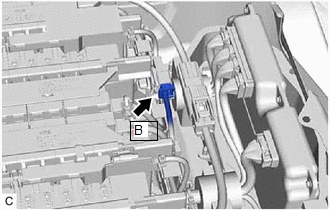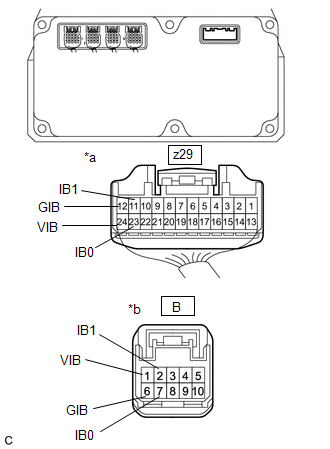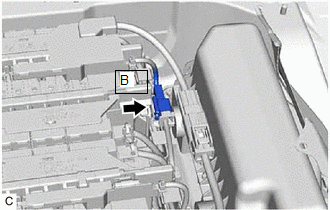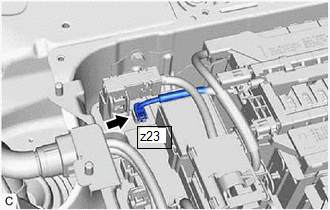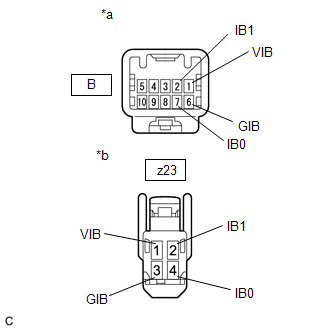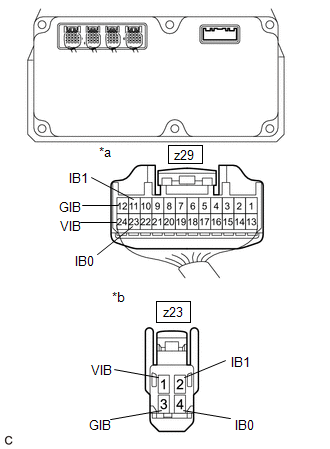| Last Modified: 07-31-2024 | 6.11:8.1.0 | Doc ID: RM100000001N312 |
| Model Year Start: 2021 | Model: Corolla | Prod Date Range: [04/2020 - 09/2022] |
| Title: HYBRID / BATTERY CONTROL: HYBRID CONTROL SYSTEM (for LITHIUM-ION BATTERY with P610): P0ABF00; Hybrid/EV Battery Current Sensor "A" Circuit Range/Performance; 2021 - 2022 MY Corolla Corolla HV [04/2020 - 09/2022] | ||
|
DTC |
P0ABF00 |
Hybrid/EV Battery Current Sensor "A" Circuit Range/Performance |
DESCRIPTION
A battery current sensor, which is mounted on the positive cable side of each HV battery junction block assembly, detects the current flowing to or from the battery pack. The battery current sensor sends a voltage, which varies between 0 and 5 V in proportion to the amperage, to the IB0 terminal of the battery ECU assembly. Similarly, it sends a voltage, which varies between 0 and 5 V in inverse proportion to the amperage, to the IB1 terminal of the battery ECU assembly. When the voltage at the IB0 terminal is below 2.8 V and the voltage at the IB1 terminal is above 2.2 V, this indicates that the HV battery is being discharged. Additionally, Meanwhile, when the voltage at of the IB0 terminal is above 2.8 V and the voltage at of the IB1 terminal is below 2.2 V, this indicates that the HV battery is being charged. The battery ECU assembly sends the signals from its IB0 and IB1 terminals to the hybrid vehicle control ECU. The hybrid vehicle control ECU determines the charging and discharging amperage of the HV battery based on the received signals and calculates the SOC of the HV battery using the cumulative amperage value.
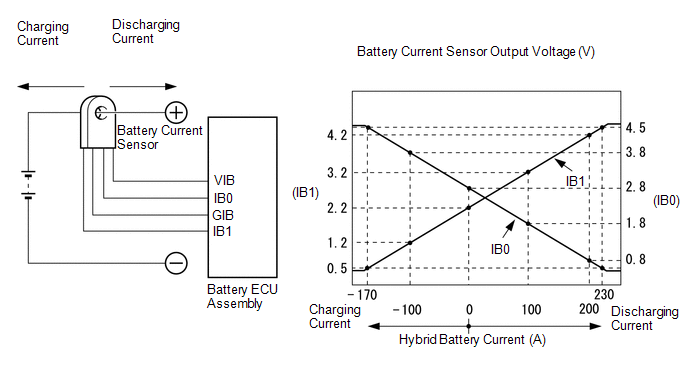
|
DTC No. |
Detection Item |
DTC Detection Condition |
Trouble Area |
MIL |
Warning Indicate |
|---|---|---|---|---|---|
|
P0ABF00 |
Hybrid/EV Battery Current Sensor "A" Circuit Range/Performance |
Abnormal battery current sensor characteristics: (based on hybrid system consumption and HV battery output). (1 trip detection logic) |
|
Comes on |
Master Warning: Comes on |
Related Data List
|
DTC No. |
Data List |
|---|---|
|
P0ABF00 |
- |
MONITOR DESCRIPTION
The hybrid vehicle control ECU detects malfunctions of the battery current sensor by monitoring motor and generator torque. If the hybrid vehicle control ECU detects a battery current sensor malfunction, the hybrid vehicle control ECU will illuminate the MIL and store a DTC.
MONITOR STRATEGY
|
Related DTCs |
P0AC0 (INF P0ABF00): Current sensor malfunction (gain or offset) |
|
Required sensors/components |
Battery current sensor |
|
Frequency of operation |
Continuous |
|
Duration |
TMC's intellectual property |
|
MIL operation |
1 driving cycle |
|
Sequence of operation |
None |
TYPICAL ENABLING CONDITIONS
|
The monitor will run whenever the following DTCs are not stored |
TMC's intellectual property |
|
Other conditions belong to TMC's intellectual property |
- |
TYPICAL MALFUNCTION THRESHOLDS
|
TMC's intellectual property |
- |
COMPONENT OPERATING RANGE
|
Hybrid vehicle control ECU |
DTC P0AC0 (INF P0ABF00) is not detected |
CONFIRMATION DRIVING PATTERN
HINT:
- Connect the Techstream to the DLC3.
- Turn the power switch on (IG) and turn the Techstream on.
- Clear the DTCs (even if no DTCs are stored, perform the clear DTC procedure).
- Turn the power switch off and wait for 2 minutes or more.
- Turn the power switch on (IG) and turn the Techstream on.
-
Drive the vehicle for approximately 10 minutes according to the freeze frame data items "Vehicle Speed", "Accelerator Position", "Hybrid/EV Battery Current", "Motor Torque" and "Generator Torque". [*1]
HINT:
[*1] : Normal judgment procedure.
The normal judgment procedure is used to complete DTC judgment and also used when clearing permanent DTCs.
- Enter the following menus: Powertrain / Hybrid Control / Utility / All Readiness.
-
Check the DTC judgment result.
HINT:
- If the judgment result shows NORMAL, the system is normal.
- If the judgment result shows ABNORMAL, the system has a malfunction.
- If the judgment result shows INCOMPLETE or N/A, perform the normal judgment procedure again.
WIRING DIAGRAM
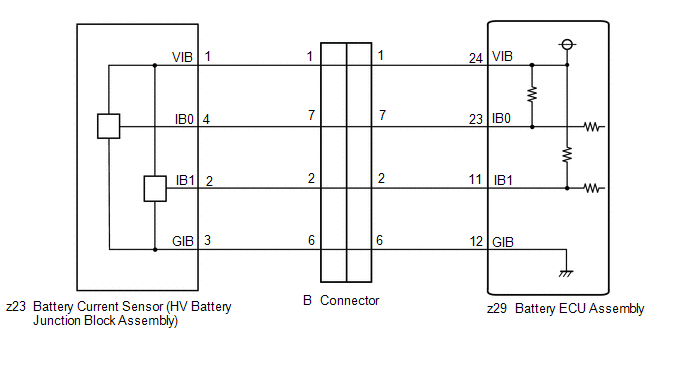
CAUTION / NOTICE / HINT
CAUTION:
-
Before the following operations are conducted, take precautions to prevent electric shock by turning the power switch off, wearing insulated gloves, and removing the service plug grip from HV battery.
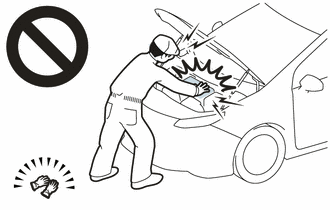
- Inspecting the high-voltage system
- Disconnecting the low voltage connector of the inverter with converter assembly
- Disconnecting the low voltage connector of the HV battery
-
To prevent electric shock, make sure to remove the service plug grip to cut off the high voltage circuit before servicing the vehicle.
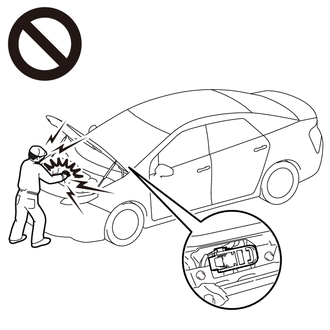
-
After removing the service plug grip from the HV battery, put it in your pocket to prevent other technicians from accidentally reconnecting it while you are working on the high-voltage system.
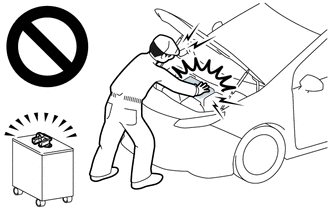
-
After removing the service plug grip, wait for at least 10 minutes before touching any of the high-voltage connectors or terminals. After waiting for 10 minutes, check the voltage at the terminals in the inspection point in the inverter with converter assembly. The voltage should be 0 V before beginning work.
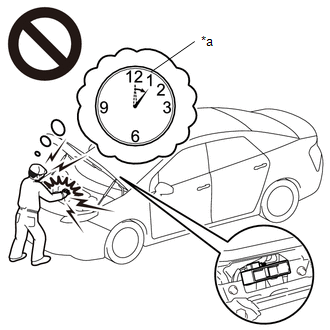
*a
Without waiting for 10 minutes
HINT:
Waiting for at least 10 minutes is required to discharge the high-voltage capacitor inside the inverter with converter assembly.
-
Make sure to insulate the high-voltage connectors and terminals of the HV battery with insulating tape after removing it.
If the HV battery stored without insulating the connectors and terminals, electric shock or fire may result.
-
When disposing of an HV battery, make sure to return it through an authorized collection agent who is capable of handling it safely. If the HV battery is returned via the manufacturer specified route, it will be returned properly and in a safe manner by an authorized collection agent.
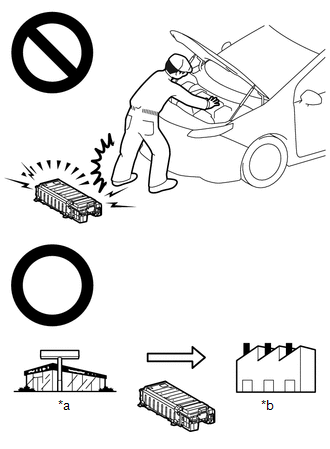
*a
Dealer
*b
Battery Collection Agent
- Before returning the HV battery, make sure to perform a recovery inspection.
- Before returning the HV supply stack sub-assembly, make sure to perform a recovery inspection.
- Make a note of the output DTCs as some of them may be necessary for recovery inspection of the HV battery and HV supply stack sub-assemblies.
-
After removing the HV battery, keep it away from water. Exposure to water may cause the HV battery to produce heat, resulting in a fire.
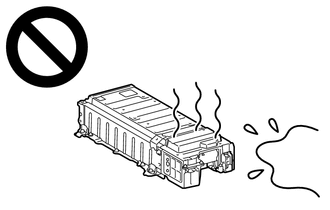
NOTICE:
After turning the power switch off, waiting time may be required before disconnecting the cable from the negative (-) auxiliary battery terminal. Therefore, make sure to read the disconnecting the cable from the negative (-) auxiliary battery terminal notices before proceeding with work.
PROCEDURE
|
1. |
CHECK HARNESS AND CONNECTOR (BATTERY ECU ASSEMBLY - NO. 1 HV SUPPLY STACK SUB-ASSEMBLY) |
CAUTION:
Be sure to wear insulated gloves and protective goggles.
(a) Check that the service plug grip is not installed.
NOTICE:
After removing the service plug grip, do not turn the power switch on (READY), unless instructed by the repair manual because this may cause a malfunction.
(b) Remove the No. 1 HV battery protector.
|
(c) Disconnect the B No. 1 HV supply stack sub-assembly connector. NOTICE: Before disconnecting the connector, check that it is not loose or disconnected. |
|
(d) Disconnect the z29 battery ECU assembly connector.
NOTICE:
Before disconnecting the connector, check that it is not loose or disconnected.
|
(e) Measure the resistance according to the value(s) in the tables below. Standard Resistance (Check for Open):
Standard Resistance (Check for Short):
|
|
(f) Reconnect the z29 battery ECU assembly connector.
(g) Reconnect the B No. 1 HV supply stack sub-assembly connector.
(h) Install the No. 1 HV battery protector.
| NG |

|
|
|
2. |
CHECK HARNESS AND CONNECTOR (NO. 2 HV SUPPLY STACK SUB-ASSEMBLY - HV BATTERY JUNCTION BLOCK ASSEMBLY) |
CAUTION:
Be sure to wear insulated gloves and protective goggles.
(a) Check that the service plug grip is not installed.
NOTICE:
After removing the service plug grip, do not turn the power switch on (READY), unless instructed by the repair manual because this may cause a malfunction.
(b) Remove the upper hybrid battery cover sub-assembly.
|
(c) Disconnect the B No. 2 HV supply stack sub-assembly connector. NOTICE: Before disconnecting the connector, check that it is not loose or disconnected. |
|
|
(d) Disconnect the z23 battery current sensor connector from the HV battery junction block assembly. NOTICE: Before disconnecting the connector, check that it is not loose or disconnected. |
|
|
(e) Measure the resistance according to the value(s) in the tables below. Standard Resistance (Check for Open):
Standard Resistance (Check for Short):
|
|
(f) Reconnect the z23 battery current sensor connector.
(g) Reconnect the B No. 2 HV supply stack sub-assembly connector.
(h) Install the upper hybrid battery cover sub-assembly.
| NG |

|
|
|
3. |
CHECK HARNESS AND CONNECTOR (BATTERY ECU ASSEMBLY - HV BATTERY JUNCTION BLOCK ASSEMBLY) |
CAUTION:
Be sure to wear insulated gloves and protective goggles.
(a) Check that the service plug grip is not installed.
NOTICE:
After removing the service plug grip, do not turn the power switch on (READY), unless instructed by the repair manual because this may cause a malfunction.
(b) Remove the No. 1 HV battery protector.
(c) Disconnect the z29 battery ECU assembly connector.
NOTICE:
Before disconnecting the connector, check that it is not loose or disconnected.
|
(d) Disconnect the z23 battery current sensor connector from the HV battery junction block assembly. NOTICE: Before disconnecting the connector, check that it is not loose or disconnected. |
|
|
(e) Measure the resistance according to the value(s) in the tables below. Standard Resistance (Check for Open):
Standard Resistance (Check for Short):
|
|
(f) Reconnect the z23 battery current sensor connector.
(g) Reconnect the z29 battery ECU assembly connector.
(h) Install the No. 1 HV battery protector.
| NG |

|
|
|
4. |
REPLACE HV BATTERY JUNCTION BLOCK ASSEMBLY |
|
|
5. |
CLEAR DTC |
|
|
6. |
PERFORM ROAD TEST |
(a) Connect the Techstream to the DLC3.
(b) Turn the power switch on (IG).
(c) Enter the following menus: Powertrain / Hybrid Control / Data List / Hybrid/EV Battery SOC.
Powertrain > Hybrid Control > Data List
|
Tester Display |
|---|
|
Hybrid/EV Battery SOC |
(d) Check that "Hybrid/EV Battery SOC" shows 60% or less.
HINT:
If "Hybrid/EV Battery SOC" is 60% or more, reduce it to below 60% by leaving the hybrid system on with shift lever in N.
(e) Apply the parking brake and secure the wheels using chocks.
(f) Turn the power switch on (READY).
(g) Move the shift lever to D while depressing the brake pedal with your left foot and repeat the following steps for 1 minute or more.
HINT:
Depress and release the accelerator pedal in 5-second intervals (2.5 seconds each) continuously.
(1) While depressing the brake pedal with your left foot, depress the accelerator pedal with your right foot.
(2) Release the accelerator pedal.
(h) Turn the power switch off.
|
|
7. |
CHECK DTC OUTPUT (HYBRID CONTROL) |
(a) Connect the Techstream to the DLC3.
(b) Turn the power switch on (IG).
(c) Enter the following menus: Powertrain / Hybrid Control / Trouble Codes.
(d) Check for DTCs.
Powertrain > Hybrid Control > Trouble Codes
|
Result |
Proceed to |
|---|---|
|
P0ABF00 is not output. |
A |
|
P0ABF00 is output again. |
B |
(e) Turn the power switch off.
| A |

|
END |
| B |

|
|
8. |
CHECK HARNESS AND CONNECTOR (NO. 2 HV SUPPLY STACK SUB-ASSEMBLY - HV BATTERY JUNCTION BLOCK ASSEMBLY) |
CAUTION:
Be sure to wear insulated gloves and protective goggles.
(a) Check that the service plug grip is not installed.
NOTICE:
After removing the service plug grip, do not turn the power switch on (READY), unless instructed by the repair manual because this may cause a malfunction.
(b) Remove the upper No. 1 hybrid battery cover sub-assembly.
|
(c) Disconnect the B No. 2 HV supply stack sub-assembly connector. NOTICE: Before disconnecting the connector, check that it is not loose or disconnected. |
|
(d) Check the terminals of the male side of the No. 2 HV supply stack sub-assembly connector.
OK:
The terminals are free of foreign matter and not damaged.
(e) Reconnect the B No. 2 HV supply stack sub-assembly connector.
(f) Install the upper No. 1 hybrid battery cover sub-assembly.
| OK |

|
| NG |

|
|
9. |
CHECK HARNESS AND CONNECTOR (NO. 2 HV SUPPLY STACK SUB-ASSEMBLY - HV BATTERY JUNCTION BLOCK ASSEMBLY) |
CAUTION:
Be sure to wear insulated gloves and protective goggles.
(a) Check that the service plug grip is not installed.
NOTICE:
After removing the service plug grip, do not turn the power switch on (READY), unless instructed by the repair manual because this may cause a malfunction.
(b) Remove the upper No. 1 hybrid battery cover sub-assembly.
|
(c) Disconnect the B No. 2 HV supply stack sub-assembly connector. NOTICE: Before disconnecting the connector, check that it is not loose or disconnected. |
|
(d) Check the terminals of the male side of the No. 2 HV supply stack sub-assembly connector.
OK:
The terminals are free of foreign matter and not damaged.
(e) Reconnect the B No. 2 HV supply stack sub-assembly connector.
(f) Install the upper No. 1 hybrid battery cover sub-assembly.
| OK |

|
| NG |

|
REPLACE NO. 1 HV SUPPLY STACK SUB-ASSEMBLY AND NO. 2 HV SUPPLY STACK SUB-ASSEMBLY |
|
|
|
![2021 - 2022 MY Corolla Corolla HV [04/2020 - 09/2022]; HYBRID / BATTERY CONTROL: HYBRID CONTROL SYSTEM (for LITHIUM-ION BATTERY with P610): UTILITY](/t3Portal/stylegraphics/info.gif)
